9 Which of the Following are main noneconomic factors (a) Social factors (b) Personality factors (c) Psychological factors (d) All of the above Answer (d) All of the above 10 The economic factors include (a) Capital (b) Education (c) Family (d) Caste Factor Answer (a) Capital 11Economic environment includs (a) Economic Condition (b Here's a look at five of these "noneconomic" category factors and the roles they are playing • Health The laws of health are arguably more powerful than the laws of economicsPromote entrepreneurship in one way or

Pdf Entrepreneurship At Country Level Economic And Non Economic Determinants
Non-economic factors of business
Non-economic factors of business-Ans It refers to an attractive and accessable economic idea which could be implemented to create a business, earn maximum profit, and leads to further growth NationalEconomic factor is definitely not the main motivating factors for individuals to engage in sustainable entrepreneurship Noneconomic factors such as sociocultural factors have well been accepted as influential drivers for entrepreneurship (Shivani et al, 06) Indeed, Thornton et al (11) have also delineated that both



23 Key Factors Affecting Business Environment Explained Googlesir
Even though capital refers to money, money cannot act as an input in the production process Hence, it cannot be considered a factor but a part of the capital, which entrepreneurs use to purchase capital goods to produce products and services The income generated with this factor is considered interestJournal of Entrepreneurship Education Volume 22, Issue 1, 19 1 THE DETERMINING FACTORS OF ECONOMIC TRANSFORMATION THAT AFFECTS THE INTENTION TO LEAVE BUSINESS ANALYTICAL STUDY OF ENTREPRENEURSHIP IN RURALEconomic Factors Dearth of finance and availability of funds are life line for any business but the prevailing financial and micro finance system in the country is not women friendly and act as a major snag for the women entrepreneurs (Jamali, 09)
Impact of Government Actions on Entrepreneurship Development The Government by its actions or failure to act also does influence both the economic and noneconomic factors for entrepreneurship Any interested Government in economic development can help through its clearly expressed industrial policy;7 What are the Links between Entrepreneurship NonEconomic Factors 1 Education Education enables one to understand the outside world and equips him with the basic knowledge and skills to deal with daytoday problems In any society, the system of education has a significant role
7 NonEconomic factors Social Conditions Legitimacy of Entrepreneurship Social Mobility Marginality Security Psychological Factors Need Achievement Withdrawal of Status Respect 7 8 Social Conditions •Legitimacy of Entrepreneurship The proponents of noneconomic factors give emphasis to the relevance of a system of norms and values within a sociocultural Some major noneconomic factors alleged to influence the emergence of entrepreneurship can be described below Legitimacy of Entrepreneurship The proponents of noneconomic factors give emphasis to the relevance of a system of norms and values within a sociocultural setting for the emergence of entrepreneurship NCERT Solutions for Class 12 Entrepreneurship Chapter1 Entrepreneurial Opportunity TEXTBOOK QUESTIONS SOLVED AVERY SHORT ANSWER TYPE QUESTIONS Q1 What is a business opportunity?




11 Non Economic Environments Affecting Business Environment
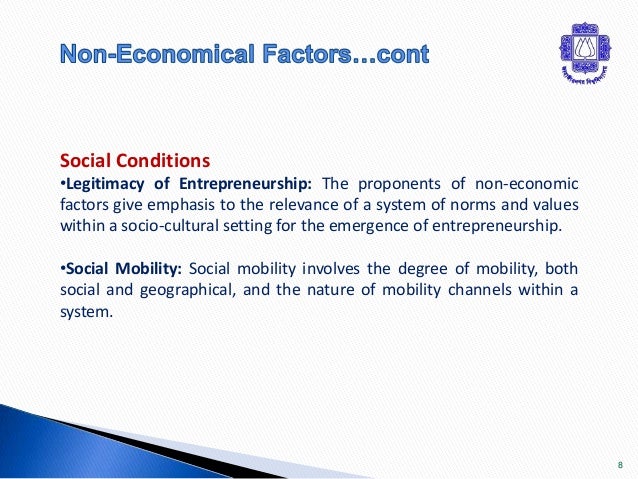



Mkt 210 Lecture 2 Factors Affecting Entrepreneurship Development
Without having any obstacles, if capital is available, it will act as a lifeline to entrepreneurs So, if capital is available, entrepreneurial activities will increase (b) Labour The quality and quantity of labour is another factor which influences the emergence of entrepreneurshipCarsrud and Brannback, 11) Table 2 The push/pull, economic/noneconomic motivation Push Pull Economic Necessity Opportunity Noneconomic Dissatisfaction Independence Social entrepreneurs seem to be motivated primarily by noneconomic motives such as the search forEntrepreneurship is not random, but influenced by four distinct factors economic development, culture, technological development and education In areas where these factors are present, you can expect to see strong and consistent entrepreneurial growth In areas where they are lacking, entrepreneurship is likely to stagnate
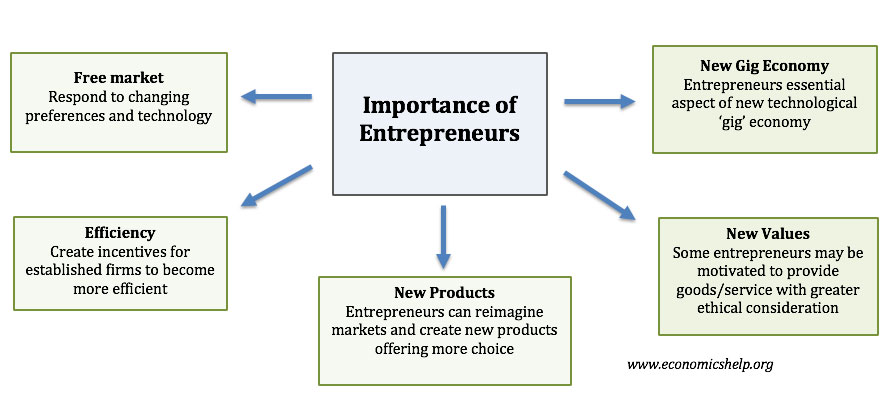



The Importance And Role Of An Entrepreneur Economics Help




Factors Affecting Entrepreneurial Growth Economic Factors Non Economic Factors Government Action Pdf
Labor Easy availability of the right type of workers also affect entrepreneurship The quality rather than the number of labour influences the emergence and growth of entrepreneurship The problem of labour immobility can be solved by providing infrastructural facilitiesEntrepreneurship characteristics of the farmers, perception ofMost of these studies used data collected in other climes outside Nigeria Other entrepreneur on factors whichempirical evidences emerginamely social, psychological, economic, managerial,studies on ng from few entrepreneurship development in agriculture (Seyed etThis book investigates the rate of occupational entrepreneurship at country level, either measured by the number of business owners as a percentage of the labor force, or by some metric of the dynamics of entrepreneurship such as 'nascent entrepreneurship' and new business startups Historical case studies set the stage for a multidisciplinary




Pdf Religion As An Explanatory Variable For Entrepreneurship Leo Paul Dana Academia Edu



Creating Ventures Decision Factors In New Venture Creation Emerald Insight
Noneconomic remittances and their contribution to entrepreneurship and economic development We offer some examples of initiatives taken in the home country and the host country to maximize the potential noneconomic remittances and their impacts on entrepreneurship development in the home country A key lesson and takeaway that we can gain from Labour The quality rather quantity of labour is another factor which influences the emergence of entrepreneurship Most less developed countries are labour rich nations owing to a dense and even increasing population But entrepreneurship is encouraged if there is a mobile and flexible labour force 2 Environmental factors These factors relate to the conditions in which an entrepreneur has to work If the environment that a individual is working in is unsatisfactory, that is, not conducive to his growth needs, it is likely that the individual will quit his job and start his own business as an entrepreneur




Factors Influencing Entrepreneurship Ability A Case Study Of Parbat District Pdf Free Download



18 Key Factors Affecting Entrepreneurship Growth In India Googlesir
In the less developed countries, people are not economically motivated Monetary incentives have relatively less attraction People have ample opportunities of attaining social distinction by noneconomic pursuits Men with organizational abilities are, therefore, not dragged into business They use their talents for noneconomic endThey view that the influence of economic factors on entrepreneurial emergence largely depends upon the existence of noneconomic factors ie, social and psychological factors in the society Some major noneconomic factors alleged to influence the emergence of entrepreneurship can be listed as follows Social Conditions Legitimacy of Entrepreneurship The proponents of non Factors Affecting Entrepreneurship Economic, Social & Cultural There are lots of factors that affect Entrepreneurship nowadays It is important to have information about major ones if you are looking to become an entrepreneur For those who don't know, the entrepreneurship can be defined as the will power to establish, operate, and develop a business




What Are The Qualities Value Of Entrepreneurs In America




Factors Of Production Overview And Characteristics
The Foundation for Economic Education (FEE) is a non political, nonprofit, taxexempt educational foundation and accepts no taxpayer money FEE's mission is to inspire, educate and connect future leaders with the economic, ethical What Institutional Factors Encourage Entrepreneurship?Rural Entrepreneurship • First as agriculture by itself has a tendency to develop at a slower pace than industry, the division of economic activities leads to uneven development • Second Industry generally leads to higher level of output per worker than agriculture, than income gap between these two group tends to widen In such situationEconomic gain is certainly one component of necessity entrepreneurship, a broader definition describes women who explore and ultimately engage in entrepreneurship, motivated by their belief that the traditional labor options available are insufficient to meet either their economic or noneconomic needs and goals (or both)




Factors Affecting The Entrepreneurial Growth Factors Economic Factors Non Economic Factors Psychological Factors Government Influence Political Factors Ppt Download




Geographical And Cognitive Proximity Effects On Innovation Performance In Smes A Way Through Knowledge Acquisition Springerprofessional De
Important than economic ones in the creation of a business (Cromie, 1987;Microentrepreneurship instead of education level (Sabli & Latiff, 19) Further, the research study investigates the impact of socioeconomic components through entrepreneurship practices in Pakistan Financial and nonfinancial measures can explain economic factors for small business achievement Thus, fiscal measures have consisted of the Economic Factors Economic factors also influence the growth of entrepreneurship The important economic factors are (A)Infrastructural Facilities Entrepreneurship development requires certain basic infrastructure like power, transportation, communication, technical information etc These provide external economies and improve the



Loyola College B Com Nov 07 Introduction To Entrepreneurship Question Paper Pdf Download Entranceindia




Pdf Entrepreneurship At Country Level Economic And Non Economic Determinants
Family circumstances Each person has different family situations It is often seen that family noncooperation is frustrated by the venture, but a person can become a successful entrepreneur with a family corporation The family environment is one of the influential factors affecting entrepreneurship




Contextual Factors Conjoint Effect On Sustainable Entrepreneurial Download Scientific Diagram




Factors Of Production Definition 4 Types Who Owns




Introduction To Entrepreneurship Boundless Business




The Importance Of Young Firms For Economic Growth Ewing Marion Kauffman Foundation Kauffman Org



1




30 Influential Factors Affecting Entrepreneurship Career Cliff




Style Cluster Hexagonal 3 Piece Powerpoint Presentation Diagram Template Slide Powerpoint Slide Clipart Example Of Great Ppt Presentations Ppt Graphics




Factors Affecting Entrepreneurial Growth Youtube




The Effect Of Social Cultural And Economic Factors On Entrepreneurship Sciencedirect
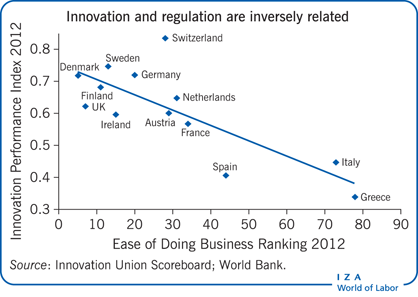



Iza World Of Labor Entrepreneurs And Their Impact On Jobs And Economic Growth




What Is Pestle Analysis Factors Advantages And Disadvantages Of Pestle Analysis




Esbm Unit 1 Wp Pdf Document
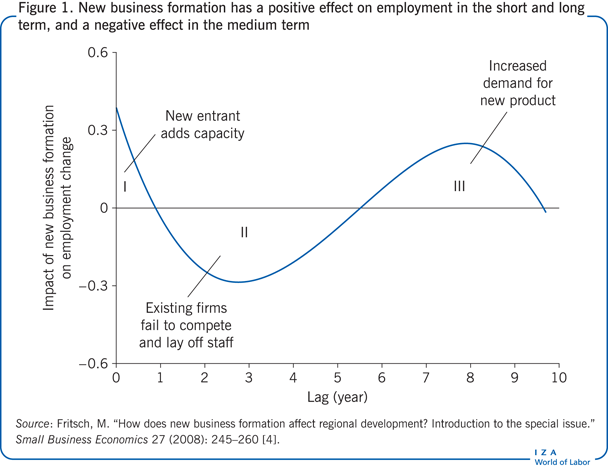



Iza World Of Labor Entrepreneurs And Their Impact On Jobs And Economic Growth




Factors Affecting The Entrepreneurial Growth Factors Economic Factors Non Economic Factors Psychological Factors Government Influence Political Factors Ppt Download




Risk Attitudes And Personality Traits Of Entrepreneurs And Venture Team Members Pnas




What Is The Economic Environment In Business Definition Importance Factors Video Lesson Transcript Study Com




Raj Economics And Commerce Classes Obstacles To Economic Development Facebook




Factors Pdf Pdf Economic Development Economics
/dotdash_Final_Factors_of_Production_May_2020-01-5239bd5e27fc4cfc81f7602af291b769.jpg)



Factors Of Production Definition
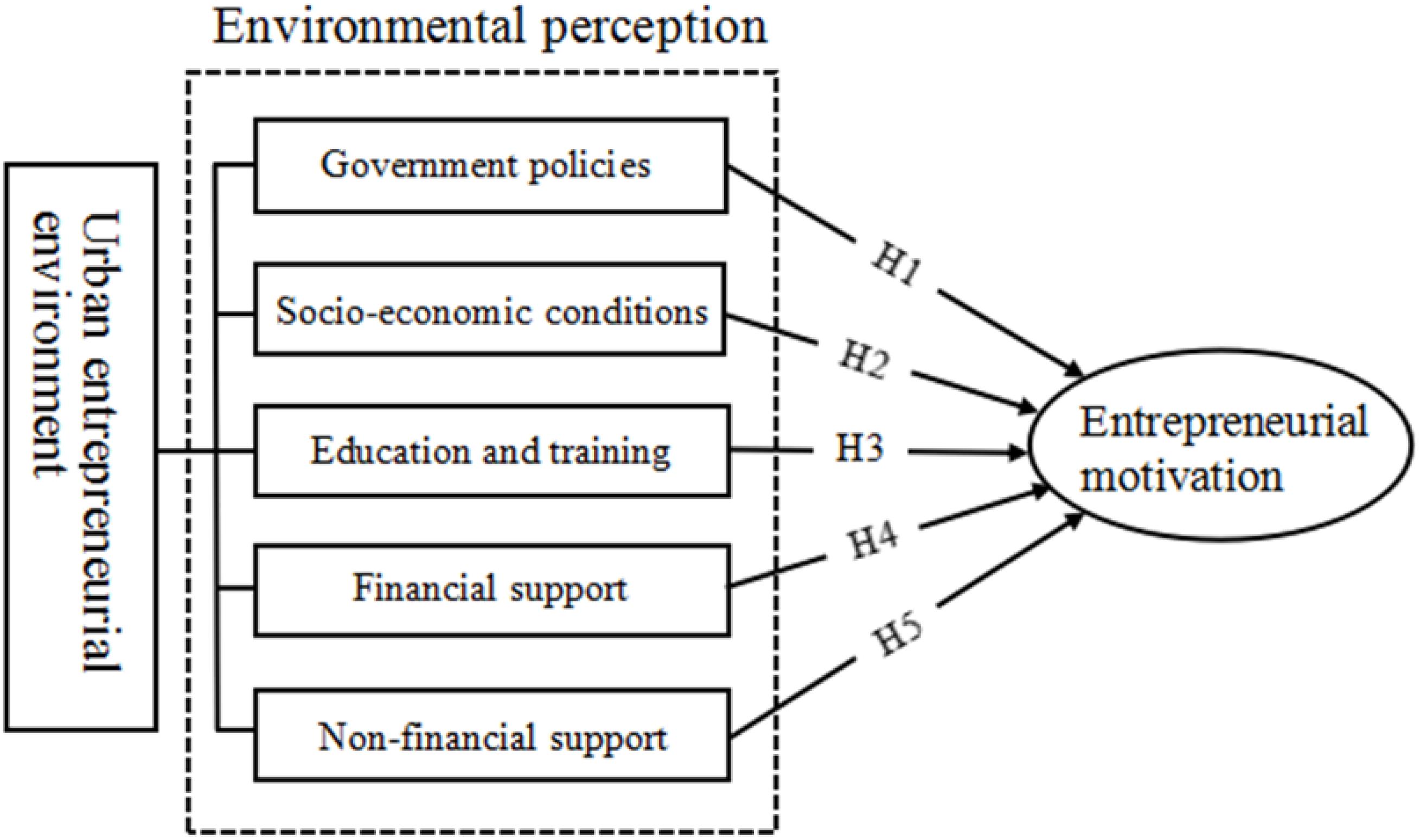



Frontiers Business Environment And Entrepreneurial Motivations Of Urban Students Psychology



Factors Affecting Entrepreneurship Development Relivingmbadays




Sustainability Free Full Text Factors Influencing Sustainable Entrepreneurship In Small And Medium Sized Enterprises In Iran A Case Study Of Food Industry Html
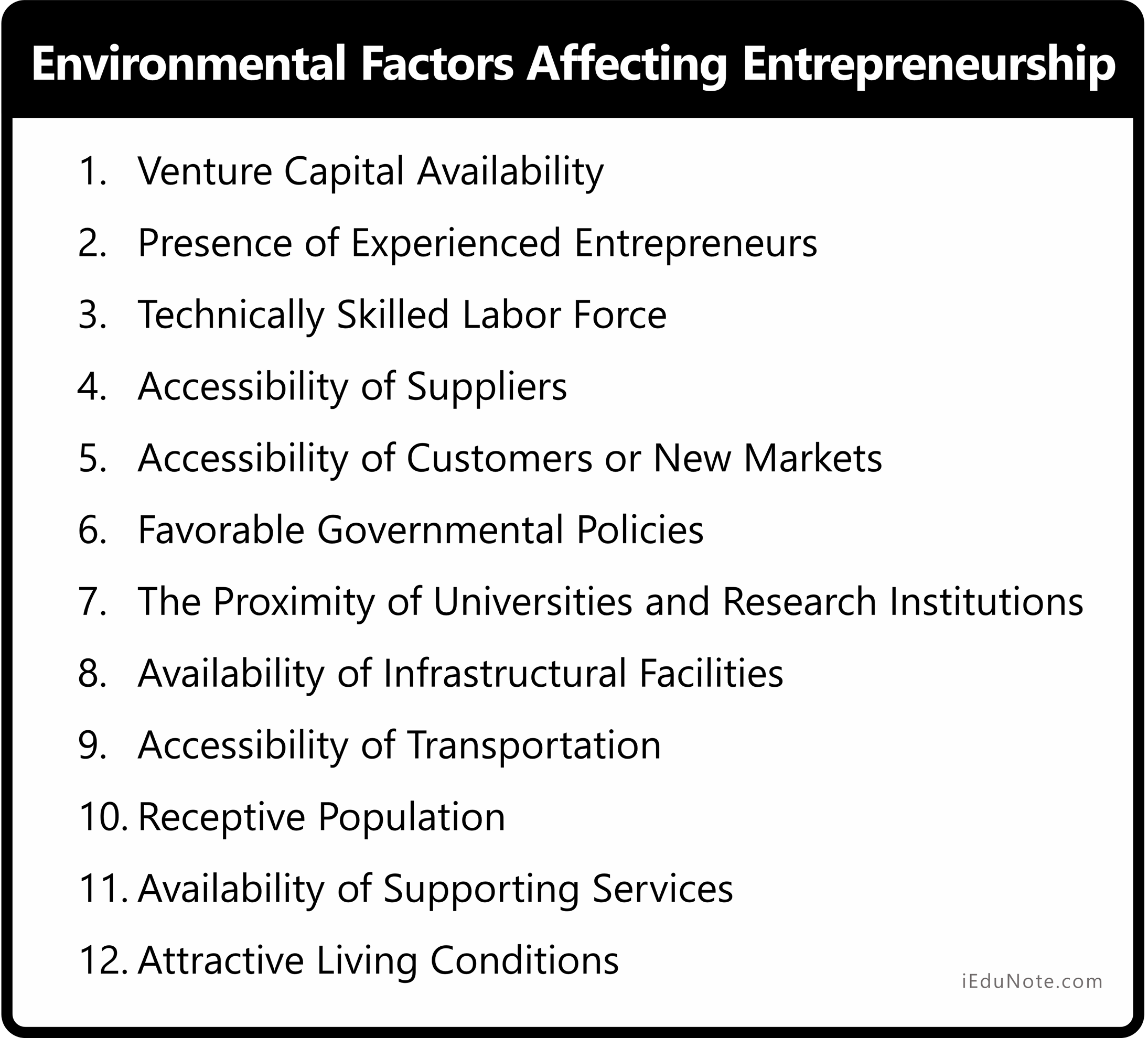



Environmental Factors Affecting Entrepreneurship




The Economic Theories Of Entrepreneurship




Technology Entrepreneurship Overview Definition And Distinctive Aspects Tim Review




Sustainability Free Full Text The Development Of Sustainable Entrepreneurship Research Field Html




What Is Economic Environment 10 Factors Affecting It




Factors Affecting The Entrepreneurial Growth Factors Economic Factors Non Economic Factors Psychological Factors Government Influence Political Factors Ppt Download



1



23 Key Factors Affecting Business Environment Explained Googlesir




Mkt 210 Lecture 2 Factors Affecting Entrepreneurship Development




M K Publishers Distributors Pdf Free Download



Creating Ventures Decision Factors In New Venture Creation Emerald Insight



Uietkuk Ac In




Economic Factors And Non Economic Factors Youtube




Social Entrepreneurship The Case For Definition




How To Growth Entrepreneurship Base Read




Pdf A Study On The Factors Associated With Eastern European Entrepreneurship In Uk Semantic Scholar
/dotdash_Final_Factors_of_Production_May_2020-01-5239bd5e27fc4cfc81f7602af291b769.jpg)



Factors Of Production Definition



Factors Affecting Entrepreneurship Simplynotes Simplynotes




Economic Factors Of Entrepreneurship In India Roarwap



1



Social




Factors Affecting The Entrepreneurial Growth Factors Economic Factors Non Economic Factors Psychological Factors Government Influence Political Factors Ppt Download




Non Economic Factors Ms Manisha Asst Prof Mba Tias On Tecnia Tv Youtube




Joitmc Free Full Text Economic Non Economic And Critical Factors For The Sustainability Of Family Firms Html




Difference Between Economic And Non Economic Environment Of Business Business Walls




Institutions Entrepreneurship And Economic Growth In Europe Springerlink




What Is The Impact Of Covid 19 On Entrepreneurship By Marie France Derderian Hospitality Net




4 Types Of Entrepreneurship Tips For Women In Business




Mkt 210 Lecture 2 Factors Affecting Entrepreneurship Development




Economic Factors Definition Examples Top Factors Affecting Business




4 Types Of Entrepreneurship Tips For Women In Business




Frontiers How Does The Entrepreneurship Education Influence The Students Innovation Testing On The Multiple Mediation Model Psychology




What Is The Economic Environment Definition And Examples
:strip_icc()/entrepreneur-what-is-an-entrepreneur-1794303_FINAL-ee745ab0c4eb49ab8da59b76bef720db.png)



Entrepreneur What Is It




Various Economic Factors That Affecting Entrepreneurship Development Qs Study




Motivational Factors For Non Degree Graduate Entrepreneurs In Kitwe Ian Banda Livres Specialises Africa Vivre




Factors Affecting Entrepreneurship




Factors Influencing The Entrepreneurial Behaviour By International Journal Of Trend In Scientific Research And Development Issn 2456 6470 Issuu
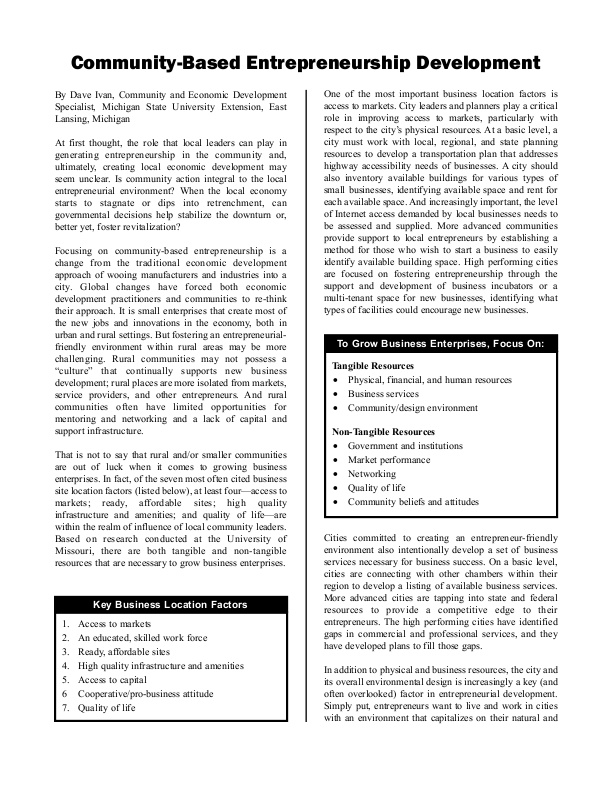



Community Based Entrepreneurship Development Icma Org




Four Factors Of Production Video Khan Academy




The Role Of Environmental Entrepreneurship For Sustainable Development Evidence From 35 Countries In Sub Saharan Africa Sciencedirect




30 Influential Factors Affecting Entrepreneurship Career Cliff



7 Reasons Why You Should Study Economics Hbs Online




Non Economic Perspectives On Entrepreneurship Springerlink




How Economic Factors Affect Business Environment Marketing Tutor




Economic Growth Wikipedia




Mkt 210 Lecture 2 Factors Affecting Entrepreneurship Development




Factors Of Production Intelligent Economist




Pdf Necessity Entrepreneurship Individual Environmental And Public Policy Related Factors Influencing The Process Of Opportunity Exploitation Under Unfavorable Circumstances Semantic Scholar
/dotdash_Final_Economic_Growth_2020-01-a0ace0fdcf3142ae94494dcfd9986daa.jpg)



Economic Growth Definition




What Impact Do Entrepreneurs Have On Society Virgin




What Is Economic And Non Economic Factors Of Entrepreneurship Brainly In




Factors Affecting Entrepreneurial Culture The Mediating Role Of Creativity Journal Of Innovation And Entrepreneurship Full Text



Full Article Entrepreneurial Persistence Beyond Survival Measurement And Determinants




Mkt 210 Lecture 2 Factors Affecting Entrepreneurship Development




What Is Entrepreneurship Types Importance Feedough
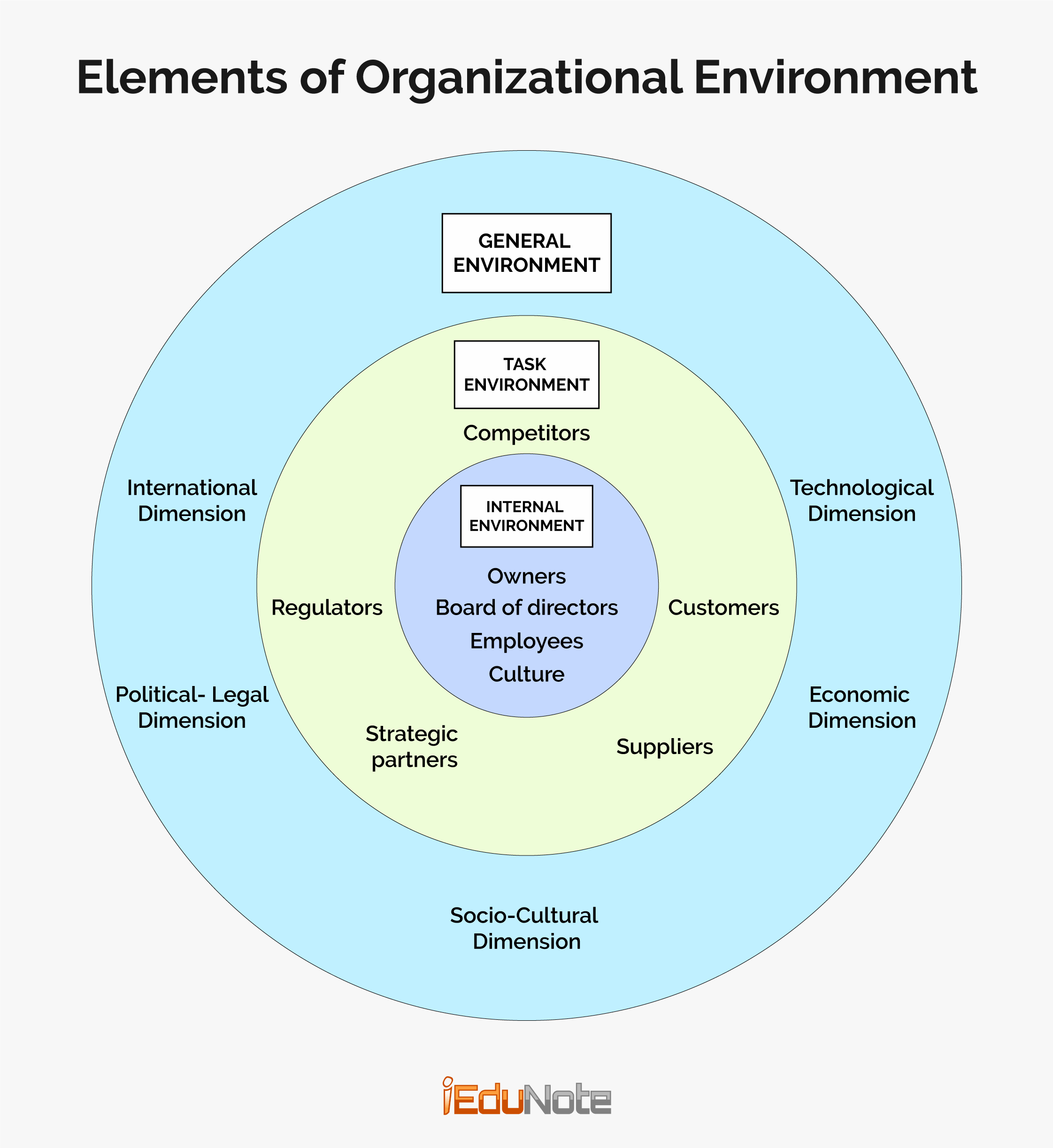



Internal And External Environment Factors That Influences Organizational Decision Making




Factors Pdf Economic Development Entrepreneurship




7 Ways Entrepreneurs Drive Economic Development



6 Ways Governments Can Encourage Entrepreneurship World Economic Forum




Factors Of Production Definition And Explanation Economics Help




Economic Factors Affecting Business Ceopedia Management Online




Pivotal Moments Brace Yourself For 31 Unexpected Paradigm Shifts In The Job Market From These External Non Economic Factors Pivotal Integrated Hr Solutions



Gacbe Ac In




Startup And New Venture Management 2 To Provide An Overview Of The Competences Needed To Become An Studocu




30 Influential Factors Affecting Entrepreneurship Career Cliff




Pdf Non Economic Factors Impact To The Business Competitiveness




Factors Affecting The Entrepreneurial Growth Factors Economic Factors Non Economic Factors Psychological Factors Government Influence Political Factors Ppt Download



0 件のコメント:
コメントを投稿